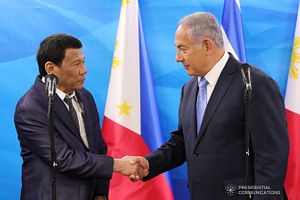Last week, indications surfaced that Israel and the Philippines would move forward with more counterterrorism collaboration. While the development is in line with current trends, the suggestion of future prospects nonetheless once again put the spotlight on the ongoing defense ties between the two countries.
As I have noted before in these pages, despite concerns around Philippine President Rodrigo Duterte’s drug war and some of his perceived anti-Semitic remarks, the Philippines and Israel have nonetheless been making inroads in the defense realm in line with Duterte’s efforts to diversify foreign relations with a number of countries for Manila’s security needs. The Armed Forces of the Philippines (AFP) has placed orders for a range of equipment from several Israeli firms, and both sides have been exploring ways to broaden security cooperation across several areas.
One of these areas has been counterterrorism, with both countries having the threat of terrorism posed by Islamic State-linked groups at the top of their list of security priorities. When Duterte made a historic visit to Israel last year – the first by a Philippine president since the establishment of bilateral ties back in 1957 – potential counterterrorism collaboration had been talked about as among the areas of cooperation on the defense side.
Last week, the defense aspect of the Israel-Philippine relationship was in the focus again talk of further advancement of collaboration on the counterterrorism front. Philippine National Police (PNP) chief Oscar Albayalde revealed that PNP personnel would be expected to undergo counterterrorism training to be conducted by the Israeli police.
Per Albayalde, the request for counterterrorism training from the Israeli police was made by the Philippines during a weeklong seminar that he and PNP officials had attended in Israel from May 27 to June 1. Speaking at a press conference at Camp Crane, he told reporters that Israeli police had been very willing to share their skills and knowledge in this area.
Albayalde added that the training, expected to be conducted at the PNP, would be focused on the many security challenges that the country had to address, including the campaign against terrorism in general and Islamic State-linked groups in particular. He noted that the Israeli police was well placed to be a partner for the Philippines in this area given its experience with the terrorism threat at home as well as the high level of training it had developed.
Few specifics were disclosed with respect to the potential additional collaboration by the two sides in this area, including what exact shape this training would take, the exact topics that would be focused on, and the timeline for its realization. Nonetheless, such manifestations of defense collaboration will continue to be important to watch to get a sense of how general cooperation is actually cohering into specific initiatives over time as both sides had intended.






























